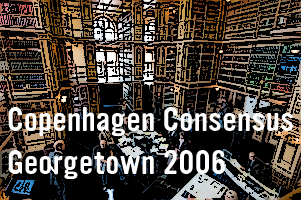Youth Forum
The Youth Forum took place in the historic Healy Hall at Georgetown University, the Copenhagen Consensus Youth Forum brought together almost 40 Georgetown students on the sidelines of an unprecedented meeting of UN ambassadors. Their common goal: to create a priority ranking of solutions to global challenges.
The students and the ambassadors received the same expert presentations, and both groups developed their own median ranking.
The students participating in the Youth Forum represented a broad range of countries from all regions of the world. They came from a variety of undergraduate and graduate programs in Georgetown College, the Edmund A. Walsh School of Foreign Service, the McDonough School of Business, the School of Nursing and Health Services, and the School of Medicine.
Moderating the Youth Forum was Maria Luise Wagner, Director of the Certificate for International Development and Visiting Assistant Professor at the Edmund A. Walsh School of Foreign Service at Georgetown University in Washington, DC. She has been teaching at Georgetown University and various universities in Latin America, the Middle East and Europe since 1987. After her retirement from a six-year tenure at the World Bank in 2001, where she designed and helped implement various strategies to increase development effectiveness, her teaching and research has focused on comprehensive analyses of the major challenges in international development.
The outcome of the Youth Forum
The Youth Forum addressed the same ten challenges as the UN ambassadors and delivered a prioritized list of the solutions. The Youth Forum was presented to the same material and by the same presenters as the UN Ambassador Panel.
The Youth Forum Rankings:
1. Reducing micro nutrient deficiencies (Malnutrition and Hunger)
2. Sustainable food and fish production in wetlands (Sanitation and Water)
3. Scaled-up basic health services (Communicable Diseases)
4. Control of malaria (Communicable Diseases)
5. Control of HIV/AIDS (Communicable Diseases)
6. Improve quality (Education)
7. Research to increase water productivity in food production (Sanitation and Water)
8. Pessimistic Doha: 25% liberalization (Subsidies and Trade Barriers)
9. Improving infant and child nutrition (Malnutrition and Hunger)
10. Investment in technology in developing country agriculture (Malnutrition and Hunger)
11. Small-scale water technology for livelihoods (Sanitation and Water)
12. Reducing Low Birth Weight for high risk pregnancies (Malnutrition and Hunger)
13. Optimal carbon tax (Climate Change)
14. Procurement reform (Corruption)
15. Reductions in the cost of schooling to increase demand (Education)

